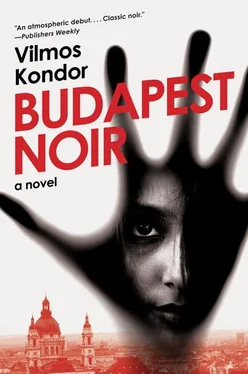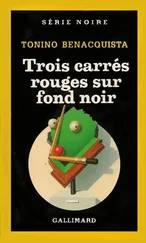Krisztina refolded the letter and returned it to the envelope. “Don’t you want to tell me what this is all about? What you got yourself beaten up for? Do you feel better, by the way?”
Gordon tried to smile, but his torn mouth made it look more like a grimace. Then, slowly, faltering, he told Krisztina the story of his visit to Red Margo.
“And this is so important to you that you’re willing to get your brain knocked out because of it?”
“Now that they’ve already half knocked my brains out, yes.”
“Zsigmond, don’t you go playing the hero,” said Krisztina, standing up.
“Calm down. I’m not playing the hero. But what else can I do? How could I look in the mirror if I didn’t try catching the person who did this? How would you look at me if I didn’t try?” Gordon didn’t see the point in sharing the threat made by the man with the crooked nose. But he had to act, and fast.
Krisztina gripped the back of the chair so tightly that her knuckles turned white. Clearly she wanted to say something, but instead she turned around and left the room. She nearly knocked down Mór, who, disheveled and sleepy, stood in the doorway holding a tray, on it a glass of milk, a slice of brioche, and a jar of jam. “It’s a waste filling him with your jam, Mór,” said Krisztina. “He’s so hardheaded he should be eating cement.”
“My grandson, oh, my boy,” said the old man, shaking his head, “you just eat this up now, and then we’ll talk.” He put the tray down by the bed and then sat beside the window. He watched in silence as Gordon slowly ate it all. “Last year’s peach jam,” he said finally, “that turned out pretty well.” Gordon nodded approvingly, then tried standing up.
“Where to, son?” asked Mór.
“I’ve got business to tend to, Opa.”
“For the love of God, you’ve got no other business than to be lying down and moaning.”
“I can moan even without lying down,” said Gordon.
“It will work better if you’re lying down,” said Mór, shaking his head.
“I can’t do that now, Opa. I’ve got to go.”
“Go? Where in the name of sweet holy hell do you have to go? You can’t even get up, much less go. But even if you managed, you’d terrify people out on the street, that’s how hideous you look.”
“I’ve got to go to Dohány Street,” said Gordon. “There’s a rabbi there whose son is called Shlomo.”
“If you ask me, there’s not just one such rabbi out there.”
“Then I’ll find this particular one and have a talk with him.”
“I’ll go talk with them all,” proclaimed Mór.
“You?”
“Yes, me. Zsigmond, you really can’t go anywhere. You’ve got to rest. What do you want to find out about that rabbi?”
“About the rabbi? Nothing. I want to find out about his son, and I want to know everything about his girlfriend.”
“I shouldn’t ask why, right?” asked Mór, fixing his eyes on Gordon. He patted down his hair, and with his other hand he buttoned his vest askew over his wrinkled shirt and necktie gone awry.
“Don’t ask, Opa.”
“I’ll go on one condition,” said Mór.
“Condition?”
“That’s right. Now you be a good boy and go to the bathroom and piss into this glass.” The old man extended a water glass to Gordon. “If your urine isn’t bloody, I’ll go. If it is, you’ll go—to the hospital. And for once I won’t open a debate.”
Gordon sighed, and staggering to his feet, he grabbed the glass and his cigarette case. Gritting his teeth, he went out to the bathroom. He closed the door behind him and, standing before the mirror, lit a cigarette. Exhaling smoke, he examined his face. He looked like some wretched boxer who’d run face-first into the glove of one serious opponent. A bandage covered the wound on his forehead, above his left eye. Mór had tied it tightly, but the blood had seeped through the gauze. Gordon’s lower lip was cracked and swollen. As he ran his tongue over it, he winced. His eyes were bloodshot, to be sure, but at least he hadn’t gotten a black eye. All in all, he didn’t look too bad. Gordon had to forgo shaving and the use of his right hand, which, bandaged as it was, still throbbed mightily. The old man had put some magic ointment on his nightstand for Gordon to apply to the wound. A clean suit and shirt, and he’d look presentable enough.
Gordon stood in front of the toilet and raised the celluloid seat. He took the glass in one hand and, wincing all the while, began to urinate. When he finished, he raised the glass. Not even a trace of blood. He set down the glass beside the sink, carefully washed his face with cold water, combed back his hair, and left the bathroom.
“Here you are, Opa,” said Gordon, putting down the glass in front of the old man. Mór held it up to the light and gave a sigh of relief.
“Son,” he declared, “I’ve never been so glad to see piss.”
“All right, then,” said Gordon, sitting down on the edge of the bed. “But now you’ve got to promise me a couple of things.”
“Go ahead.”
“Keep an eye out on the street. Is anyone following you? Don’t just pay attention to the pedestrians but also to the cars. When you leave the building, look around carefully to see if you spot a parked car with someone behind the wheel. Stick close to the buildings as you walk, but move to the edge of the sidewalk every time you pass a doorway. Make some sudden stops along the way and look behind you, but not conspicuously. If you see anyone who looks suspicious, don’t confront them; sit down in a café instead, order a drink, then come home.”
“Understood,” said the old man.
“You might not turn up anything, by the way. It’s Sunday, after all—Dohány Street and the streets around it are like a ghost town today.”
“Don’t you worry, son. I’ll work it all out.”
“Just be very careful.”
“I will. And you will stay home and stay in bed.”
“That’s what I’ll do, Opa,” said Gordon.
“Krisztina!” Mór called out. Once she appeared in the doorway, he added, “Don’t you let him get up. He’s got to stay in bed, or else who’s to say what will become of him.” He stood up and mindfully rebuttoned his vest. Krisztina adjusted his tie, whereupon he pressed his hat onto his head and went out the door.
Hardly had his grandfather left the flat when Gordon rose up out of bed. With unsteady steps he went to the telephone and, using his left hand, picked up the receiver. But then it hit him that dialing with his bandaged, throbbing right hand would be impossible. He set down the receiver and tried dialing with his left hand, but it didn’t work. Krisztina watched from the doorway as Gordon hobbled over to the window, picked up a pencil, and used it to dial. But the pencil kept slipping out of his hand. After the fifth attempt, he angrily threw the pencil to the floor and turned to Krisztina. “Would you help me already, for the love of God? Or are you enjoying this?”
“Who do you want to call?” asked Krisztina in an icy voice.
“The Sztambul Coffeehouse.”
“And why?”
“Because I have to talk to someone.”
“Well, now. You’re kidding.”
“Are you going to help me or not?”
Krisztina stepped over to the telephone and Gordon dictated the number by heart. When it rang, Krisztina handed him the receiver.
“Is Jenő Strausz there?” asked Gordon. Having heard the reply, he put the receiver back on the phone, returned to the bedroom, and with difficulty began getting dressed. Arms crossed, Krisztina just stood there and watched.
“Where are you off to?”
“I’ve got business.”
“Business. After getting beaten to a pulp, you just have some business to tend to. May I ask what?”
Читать дальше
Конец ознакомительного отрывка
Купить книгу












